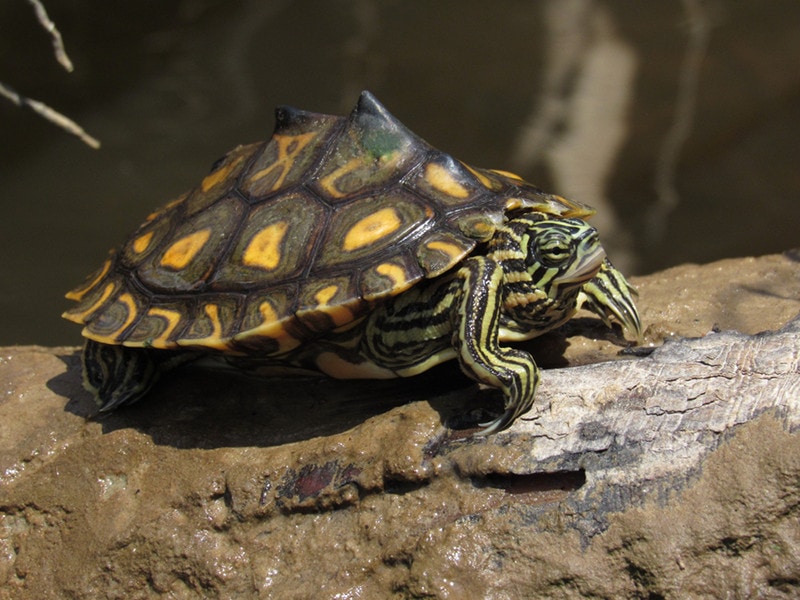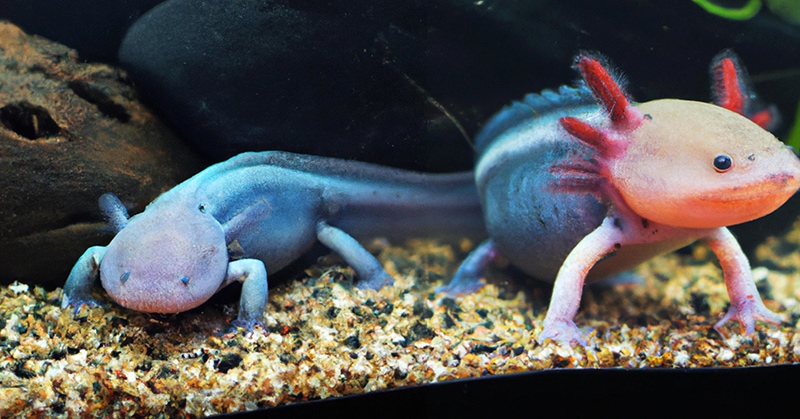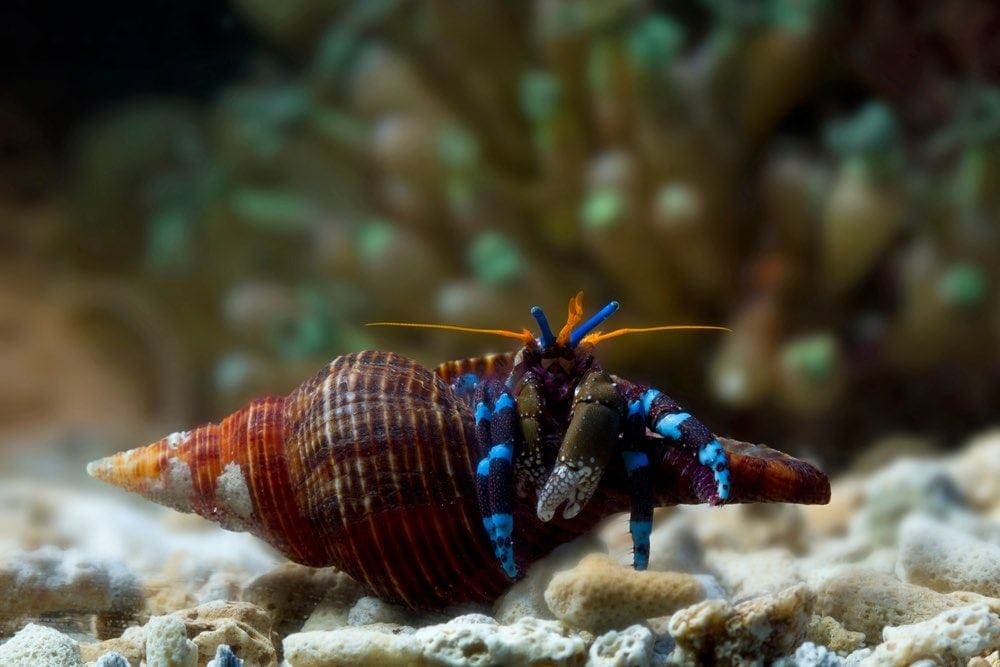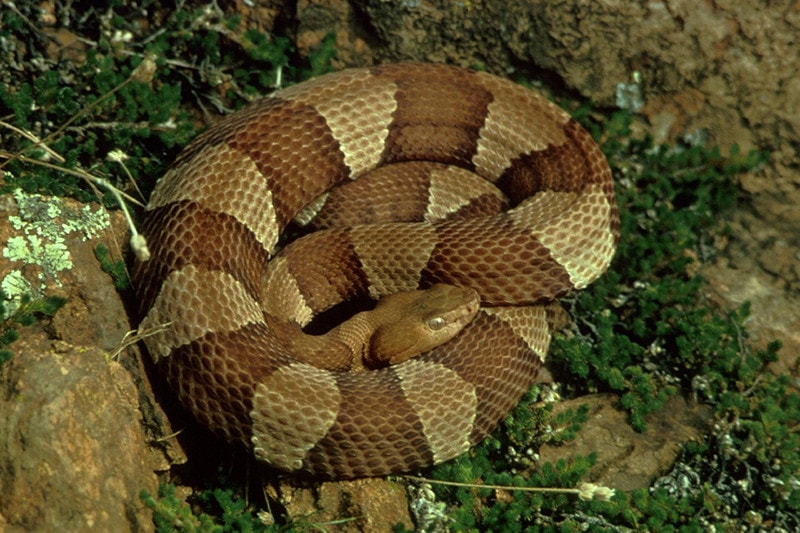What Is an Exotic Pet? Vet-Verified Info, Species, Legalities & FAQ

Updated on

Although cats and dogs are the most popular pets, there are many pets out there besides these traditional ones. People keep things such as birds, rodents, reptiles, and fish as pets. However, uncommon domestic animals, ones considered to be exotic pets, may be illegal to own, require special licensing, or require special care and may require an exotic pet veterinarian. So, it’s important to understand what exactly an exotic pet is so that you know what is required for owning one and whether the pet you have is, indeed, exotic.
What Exactly Are Exotic Pets?
An exotic pet is a pet that is not considered to be a common domestic animal, such as a cat or dog. Exotic pets include animals such as birds, reptiles, amphibians, small mammals, fish, and invertebrates. Due to the wide range of species available for purchase or adoption from breeders and private owners alike, exotic pets have grown in popularity over the past few years.

What Are Different Types of Exotic Pets?
- Reptiles: snakes, lizards, turtles, tortoises, bearded dragons
- Amphibians: frogs, toads, axolotls
- Birds: includes all pet parrots (psittacines), pet songbirds (passerines), chickens, ducks, quails, etc.
- Small mammals: sugar gliders, hedgehogs and chinchillas.
- Fish: salt-water fish and freshwater fish
- Invertebrates & mollusks: tarantulas, scorpions, snails, and hermit crabs.
Availability of Exotic Pets
Exotic pets can be purchased from breeders, pet stores, or private owners. While there are some animals that are relatively easy to obtain, others may require the assistance of an experienced exotic pet professional such as a vet or breeder. Some states and countries also have laws regulating the sale and possession of exotic animals.
Caring for Exotic Pets
It is important to research and understand the care requirements of each species before deciding to purchase an exotic pet. Generally, these animals require more specialized diets and housing than traditional domesticated pets. It is also important to provide regular veterinary checkups for these animals as they may suffer from health issues not common among traditional pets.

Advantages of Exotic Pets
The advantages of owning an exotic pet depend on the species in question. Generally, these animals can be rewarding companions and provide enrichment for their owners. Exotic pets may also have longer lifespans than traditional domestic species. In addition, some exotic animals are easier to care for than other more common pets such as dogs or cats.
Disadvantages of Exotic Pets
Exotic pets can also have some disadvantages. These animals may require more specialized diets and housing than traditional pets, which can make them difficult to care for properly. Some exotic species are difficult to handle and pose a danger to their owners or those around them. In addition, these animals may be illegal in some areas due to safety or health concerns.
A Word About the Illegal Pet Trade
The illegal pet trade is a serious concern for exotic animal owners and conservationists. This industry exploits rare species, often captured from their native habitats, and profits from the potential danger that such animals may pose in captivity. It is important to purchase exotic pets only from reputable breeders or pet stores as this can help to reduce demand for illegally obtained animals.
Legality of Exotic Pets
The legality of owning an exotic pet depends on the species as well as the laws in your area. Some states and countries have laws that prohibit or limit the ownership of certain animals, while others may only require permits for their possession. It is important to consult with local authorities before considering an exotic pet, as this can help ensure that you are not breaking any laws.
Exotic Pets That Can Be Dangerous
It is important to remember that some exotic pets can be dangerous, even if they are legal in your area. It is essential to research the species thoroughly and make sure you understand their behavior and needs before taking ownership. Species such as large constrictor snakes, primates, big cats, and venomous reptiles should only be kept by experienced owners with the proper permits.

The Ethics of Owning Exotic Pets
In addition to considering the legality of owning an exotic pet, it is also important to consider the ethical implications. Every living creature has a right to live in their natural environment and should not be subjected to unnecessary suffering or confinement. Before acquiring a new exotic pet, think carefully about whether you are capable of providing them with the care they need both physically and psychologically. Exotic animals are not suitable for everyone, so it is important to do your research and ensure you can give them the best possible life before making a commitment.
It is also important to note that many exotic species have complex dietary, housing, and social needs that can be difficult to meet in captivity. If you decide an exotic pet is right for you, make sure they are purchased from a reputable breeder or rescue organization and not taken from the wild. Taking an animal from their natural habitat can have devastating consequences both for the animal in question and its ecosystem.
Exotic Pet Ownership Tools of the Trade
No matter what type of exotic pet you own, there are some essential “rules” you’ll need to be aware of so that you will need to care for them properly.
- Proper Enclosure: This must be large enough to provide adequate space and environmental enrichment, as well as secure against any potential escapees.
- Lifespan: Some exotic pets have remarkable lifespans and are able to outlive their human counterparts. You may have to plan a future for your pet in the unfortunate event that they outlive you.
- Diet: Many exotic pets require specialized diets that can be tricky to acquire; at times, you may have to grow their food!
- Heating/Lighting: Depending on the species, some exotic pets may need supplemental lighting and heating in order to maintain proper temperature, humidity, and daylight cycles.
- Supplies: This includes water bowls, food dishes, toys, hides and any other items necessary to keep your pet healthy and happy.
- Veterinary Care: Exotic pets may require specialized veterinary care that is not available at all traditional clinics. It is important to research potential veterinarians in your area that are experienced with exotic pets.
- Training: Some exotic pets may require training, either at home or through a professional trainer, in order to ensure proper handling and care.
- Research: As with any pet, it is essential to do thorough research before taking on an exotic pet. This includes understanding the pet’s needs, any potential dangers and laws in your area.
- Support: Many exotic pet owners benefit from joining a local club or society to get advice and support from experienced owners. The internet can also be an invaluable resource for finding information on care, training and other aspects of owning an exotic pet.

Frequently Asked Questions (FAQs)
How Can I Learn More About Exotic Pets?
There are many online resources available to help prospective exotic pet owners learn more about the species they are considering. It is also important to consult with a veterinarian or specific animal specialist who is familiar with the particular species. Additionally, joining an exotic pet club or society can be an excellent way to find reliable information and make connections with other owners.
Do Regular Vets Treat Exotic Pets?
Some veterinarians may be familiar with the care and treatment of certain species of exotic pets, but it is important to check first before relying on them. It is best to find a veterinarian who specializes in exotic pet medicine as they will have the most experience and knowledge about these animals. Additionally, many zoos, aquariums, and wildlife centers offer veterinary care for exotic pets.
What Do Exotic Pets Eat?
Each species of exotic pet has their own dietary needs, so it is important to research the specific requirements of the animal you are considering.
Are You Prepared for Live Feeding?
The proper care and feeding of any pet is an important aspect of ownership and this is especially true when it comes to exotic pets. Many species have specialized diets and require live animals or insects in order to survive. This can be difficult for the sensitive or squeamish. It can also be difficult for children. Before getting an exotic pet, it is essential to make sure you are prepared and willing to feed them the proper food items. Additionally, exotic pet owners should consider preparing for any emergency situations such as illness or injury that can arise while feeding.

Where Can I Find an Exotic Pet?
Reputable breeders and pet stores are the best places to find an exotic pet. It is important to do your research and make sure you purchase from a trusted source. Additionally, many shelters and rescue organizations specialize in certain species of exotic animals, so these may be worth exploring as well.
Is it Safe to Have an Exotic Pet?
Exotic pets can be safe, but it is important to remember that some species are more dangerous than others. It is essential to research the animal thoroughly and make sure you understand its behavior and needs before taking ownership. Additionally, many areas have laws that regulate or prohibit certain types of exotic animals, so it is important to consult with local authorities.
What Types of Care Are Needed for an Exotic Pet?
Exotic pets require specialized care and attention in order to stay healthy and happy. Depending on the species, this may involve providing a proper diet, housing, and enrichment activities such as playtime or toys. It is important to research your pet’s needs and make sure you have the time and resources to provide for them.

What Is the Cost of Owning an Exotic Pet ?
Owning an exotic pet can be expensive. Depending on the species, you may need to invest in specialist housing, heating and lighting systems, veterinary bills, food and supplies. Additionally, many areas require permits or special licensing for certain exotic animals, so it is important to factor this into your budget as well.
Ultimately owning an exotic pet comes with a lot of responsibility and potential costs. It is essential to do your research and make sure you fully understand the needs of the animal before taking on ownership. An informed owner will be able to provide proper care for their pet and ensure its safety and wellbeing at all times.
What if Owning an Exotic Pet Turns Out to Be Too Much for Me?
If owning an exotic pet turns out to be too much for you, it is important to take steps to rehome the animal. This can be done by contacting a rescue organization or shelter that specializes in the species of your pet. Additionally, you may be able to find a new home through classified ads or other resources. Rehoming should always be a last resort and should only be done if you are unable to provide the pet with proper care.
There is a lot to consider when it comes to owning an exotic pet. It is essential to do your research and make sure you understand the needs of the animal before taking on ownership. Additionally, it is important to remember that owning an exotic pet is a long-term commitment and requires proper care, attention, and resources. With the right knowledge and preparation, owning an exotic pet can be a rewarding experience.
Which Exotic Pet Is Right for Me?
The best exotic pet for you depends on your individual needs and preferences. It is important to do research and make sure you have the time, resources, and knowledge needed to provide proper care for the animal.
- What type of exotic pet is best suited to my home and lifestyle?
- How much maintenance will my pet require?
- Is this species legal where I live?
- Do I have the financial resources to provide for my pet?
- Is this a time commitment I’m ready for?
Answering these questions can help you determine which exotic pet is right for you and ensure that you can provide the best possible care for your pet.

Conclusion
Exotic pets can be an exciting addition to your home, but it is important to research the species thoroughly and make sure you understand their needs before taking ownership. Additionally, many areas have laws that regulate or prohibit certain types of exotic animals, so it is essential to consult with local authorities. With the right care and attention, owning an exotic pet can provide educational opportunities and conservation efforts, as well as a rewarding experience for the right owner.
See Also:
Featured Image Credit: Gabbie Berry, Shutterstock













